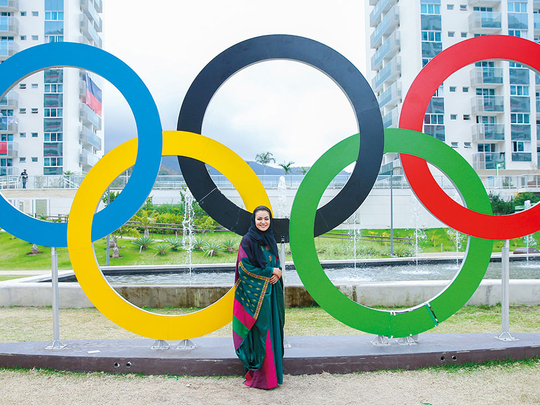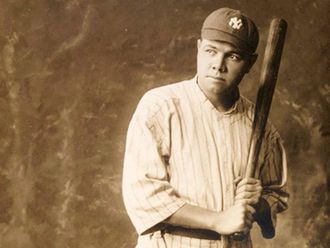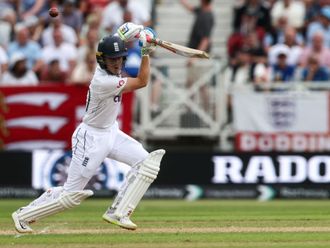
London: “This is a victory worth celebrating,” Kariman Abuljadayel says as she reflects on a momentous year for Saudi Arabian women. “We now feel more self-sufficient, independent, and empowered.”
Her country lifted its ban on women driving in June, just a few months after women were allowed in sports stadiums and the inaugural all-women’s run took place in Riyadh in March.
Abuljadayel appreciates such game-changing reforms, which are part of the kingdom’s Vision 2030 plan to repackage itself as more modern and moderate, more than most because she herself is a history-maker.
- Kariman Abuljadayel | Saudi Arabia athlete
The 24-year-old became the first Saudi woman to compete in the 100 metres at the Olympics when she took part in the 2016 Rio de Janeiro Games.
In an exclusive interview with Gulf News, she outlines her desire to compete at the next Olympics, in Tokyo in 2020, and urges other Saudi women to join her by capitalising on their unprecedented era of emancipation.
“I’ve seen many positive effects since the bans were lifted,” Abuljadayel says. “If you visit a mall here in Saudi, you’ll see that the majority of people handling sales are women and that’s a positive phenomenon and a huge step in the right direction because any community is made up of men and women. If women rise, then half of the society rises and the whole country performs better in many aspects.
“I had to do what nobody else had done in Saudi [Arabia]. I was training diligently for the Olympics at a time when the idea of a Saudi woman becoming an Olympian was [still] very foreign and considered impossible to some. But I always believed that it takes just one person to take this leap of faith and the rest would follow.
“Thankfully, I went to the Rio 2016 Olympics. Since my participation, I’ve seen a lot of positive changes and started to see women more involved in sports. You can now see many athletes training in different sports, new clubs that organise recreational sports, or even just more fitness centres spread out across the country.”
Abuljadayel describes being unable to attend sports events in her homeland when she was growing up as “a huge miss.”
Yet she would not be deterred from pursuing her passion for sport.
“Along with my friends, I was part of a football team and we organised matches in our school in Riyadh. All proceeds from the matches went to the workers in our school,” she says.
Abuljadayel never dreamed of participating in the Olympics, however.
But then came the watershed moment in the summer of 2012 when Saudi Arabian women were first allowed to compete at the Games in London following pressure from the International Olympic Committee.
Sarah Attar, an 800-metre runner, joined judo player Wojdan Shaherkani in making history for their country.
Attar provided one of the abiding images of those Olympics when, resplendent in a white hijab and vibrant green, long-sleeved jacket, she became the first woman from the kingdom to compete at the Games. The then 19-year-old received a standing ovation and worldwide acclaim for her landmark achievement, despite finishing last in her qualifying heat by some distance.
Abuljadayel was so inspired that she joined the track team of Northeastern University in Boston, Massachusetts, where she studied architecture.
Just four years later, she was one of four females competing for Saudi Arabia at the Rio Olympics. She finished seventh in her 100 metres heat — she ran in an eye-catching hijab and black bodysuit — but was also widely lauded for her pioneering feat.
Abuljadayel will not be competing in the Asian Games, which begins in Jakarta on August 18, as she is adapting to a change of discipline after switching from the 100m to the 400m. Her coach felt that the statuesque six-footer’s stride pattern would better suit longer distances.
Yet while Abuljadayel is fully focused on her day-to-day training, which she admits can sometimes be “overwhelming”, she cannot help but ponder what might be in two years’ time.
“It’s still a dream of mine to participate in the Olympics. We all know that there are only three medals in one competition and to get there I need to push myself constantly out of my comfort zone.
“My goal, if I ever participate again [at the Olympics], is to perform better than I did last time and qualify for the next rounds until I reach my top potential.
“My first Olympics were a huge learning curve for me. The whole journey taught me a lot and I gained valuable experience, so I’m so blessed to [have participated] in such an event.”
The intrepid Abuljadayel seems equipped for any challenge she faces on and off the track, including that of being a role model in her homeland and the Middle East in general. Eloquent and charming, she has also flourished academically, becoming an accredited architect after being awarded her bachelor’s and master’s degrees.
“My job is to be committed and have a great work ethic. If others feel inspired and consider me as their role model, then it’s a responsibility I would proudly take and appreciate.”
Does she have a message for other aspiring Arab sportswomen?
“There was a sign in my team’s locker room back in college where it says: ‘Inches make champions’,” she replies. “My advice to anyone is to focus on the little things before the big things because they end up being the determining factor. Never cut corners and one day you’ll get where you want to be no matter how hard it may look at first.”
If such advice is embraced with the verve Abuljadayel exudes, then she believes the sky really is the limit for Saudi sportspeople despite their undistinguished Olympic track record.
The kingdom has claimed only three medals — one silver and two bronze — from its 10 previous appearances at the Games.
Yet Abuljadayel insists a hitherto incredible gold is no longer an impossible dream for Saudis.
“It’s definitely possible to see Saudis winning gold. The idea of getting an Olympic medal isn’t far-fetched at all.
“Saudi women are talented and hard workers. I believe they can achieve anything, including a gold medal in the Olympics. We just need to work on how to achieve that as it takes years of preparation and hard work from the athlete and the coach. You need to have the mentality of a gold medallist to be a gold medallist.
“We’ve just started investing in sports [for women] in the community and I believe this will grow into something even bigger in the future. Some people get discouraged when they compare us with other advanced countries in sports-related issues.
“But these countries were established many years ago and you can’t compare our chapter one or two [of sporting history] with their chapter 50. We’re getting there and we need the support of everyone to help elevate sports in Saudi Arabia.
“The greater the will, the greater the success.”
— The author is a writer and editor based in the United Kingdom











